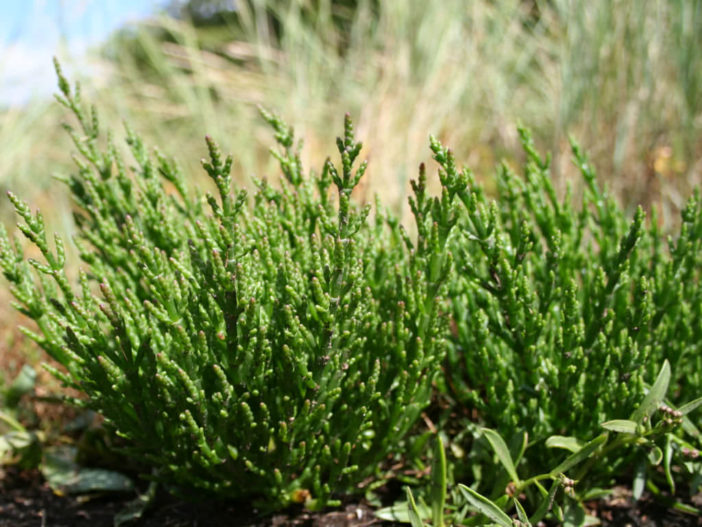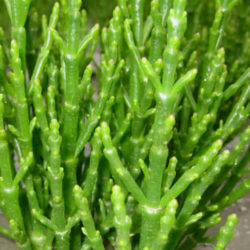Scientific Name
Salicornia europaea L.
Common Name(s)
Glasswort, Common Glasswort, Marsh Samphire, Chicken Claws, Sea Asparagus, Sea Pickle
Synonym(s)
Salicornia europaea var. herbacea, Salicornia herbacea, Salicornia virginica
Scientific Classification
Family: Amaranthaceae
Subfamily: Salicornioideae
Tribe: Salicornieae
Genus: Salicornia
Description
Salicornia europaea is an annual much-branched succulent with tiny scale-like leaves that surround the fleshy branches and extend from one branch joint to the next. It can grow up to 20 inches (50 cm) tall. The branches are erect, or the lower ones prostrate.
The flowers are tiny, have both male and female organs, and appear in late summer.
This plant is edible, either cooked or raw.

Hardiness
It is grown as an annual plant, so it has no USDA hardiness zone.
How to Grow and Care
Several subspecies are recognized. The best forms for food production are bushy plants up to 16 inches (40 cm) tall with an upright habit that keeps the branches out of the mud.
Glasswort prefers fertile organic soil with ample nitrogen and regular watering. This species is little, if at all, cultivated, and its exact requirements are not clearly understood. It is unknown if the plant will require periodic inundation by salty water to grow well.
This plant can succeed in gardens if sown as soon as the seed is ripe in the fall in well-drained soil. However, it is a very variable plant both in size and the number of branches produced.
Uses
Once described as the poor man's Asparagus, it is now fast becoming a trendy garnish in many gourmet restaurants. That said, this is a fantastic vegetable in its own right or can be made into a wonderful pickled vegetable.
The plant is at its best for eating in late summer. The stems are succulent but have a thin, woody core that is easily removed. Its leaves stick out as small protrusions from the main stem. They are best harvested when about 6 inches (15 cm) long, the top 4 inches (10 cm) being used, leaving the bottom 2 inches (5 cm) to produce new shoots. The edible leaves are occasionally sold in local markets.
Origin
Salicornia europaea is native to the coasts of western Europe, including Britain.
Links
- Back to genus Salicornia
- Succupedia: Browse succulents by Scientific Name, Common Name, Genus, Family, USDA Hardiness Zone, Origin, or cacti by Genus
Photo Gallery
Click on a photo to see a larger version.


